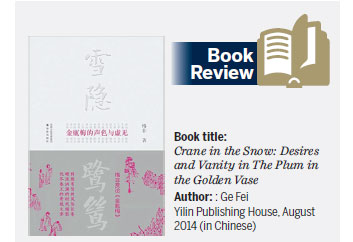Business and pleasure in 16th century China
Updated: 2015-09-18 07:44
By Wang Shanshan(HK Edition)
|
|||||||||
When books are banned, they may still be available to a small number of people. Jin Ping Mei (The Plum in the Golden Vase), the remarkable naturalist novel from the 16th century, was one such.
In 1987, Ge Fei, a college teacher in Shanghai, wrote educational authorities an application, asking to buy a copy of Jin Ping Mei, for "internal circulation".
The book has been banned repeatedly in different periods of time, for its graphic and explicit description of sexuality.
Several months later, when Ge received a copy of the book, he couldn't stop talking about it. After two months it was stolen from his office.
The loss only made Ge more curious about Jin Ping Mei. Its author had made every effort to hide his identity. After nearly 30 years of researching the subject, Ge, now a professor of Chinese literature at Tsinghua University, has published a collection of short essays titled "Crane in the Snow: Desires and Vanity in The Plum in the Golden Vase".
Ge was putting together a jigsaw puzzle. He looked into the narratives about law, business, family and sex relationships in Jin Ping Mei, and reconstructed the picture of a rich and rotten society in the late Ming Dynasty (1368-1644). Ge's book was first published in August 2014, and has already gone into three reprints.
The story of Jin Ping Mei centers on a successful businessman and his wives living in a prosperous city with a fictitious name. The emperor and his eunuchs visited the city occasionally. The hundreds of shops in it were busy day and night. It's a city where people arrived from every corner of China to visit the brothels, watch plays and indulge in night-long drinking binges.
The city, on the bank of the 1,800-km-long Grand Canal, had a major customs department, set up during the Ming Dynasty to tax the goods that arrived by the waterway. Rice, silk, seasonal delicacies and luxury goods were transported northward along the canal from eastern China to Beijing. Cotton from the north traveled south.
Businesses flourished and businessmen were powerful. An extremely expensive shad, caught a thousand kilometers down south, ought to have been dedicated to royalty at the Forbidden City in Beijing. However, it was preserved in ice and transported along the Grand Canal, appearing on businessmen's banquet tables before that could happen.
Men and women shared the same space, although talking across genders was still a taboo. Same-sex relationships were acceptable. Several streets were lined up with brothels, which often doubled as meeting venues between businesspeople and officials.
Everyone in the city seemed to have a role in a business enterprise. Army officers owned restaurants and silk stores. Government officials put a price on quotas for trading salt and other state-controlled goods. Eunuchs owned brick factories. Business agents linked together shop-owners, boat-owners and powerful officials. Buddhist nuns, who visited families and talked to the wives living in the inner chambers of a household, were more interested in selling scriptures than providing solace to those who were miserable.
Although the city's residents worshipped money, they would not hoard it. "Money loves to move, not to stay put. Money is born to be used. If someone piles up money in his house, there is less money that others can use. It is a crime to let money stay put," said Ximen Qing, the businessman protagonist of the novel. The money he made was either invested or consumed.
As the owner of a large business, Ximen's day would be divided between drafting and signing contracts and networking. Everyone, including those in the lower rungs of society seemed to be able to recite the laws. Enforcement of laws often led to brutal abuses because the judiciary was rotten.
Sexuality was explored as explicitly as food and luxuries were pursued. In fact, the largest number of literary works in Chinese with erotic content was produced in the 16th century. The writers all claimed to be documenting their times.
In the time of growing focus on desires and riches, Confucianism had to take a back seat. There was major corruption in politics. The author of Jin Ping Mei was striving to fill in the void in the value system. It did not seem to matter so much to him as to whether the people he wrote about were good or evil. What counted was if they were genuine. The genuineness of negative characters made them more interesting and impressive than the rest.
Such desires and vanity ended abruptly with the arrival of the Manchus from the north who founded the Qing Dynasty (1644-1911). But social life during the Ming Dynasty sounds so familiar when I read about them 400 years later. There is enough in them to beat Sex and the City, hands down.

(HK Edition 09/18/2015 page11)